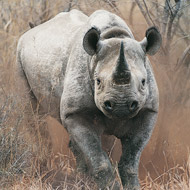Slight fall in rhino poaching

"The poaching epicentre has spread to neighbouring Namibia and Zimbabwe, but is nowhere near being extinguished in South Africa."
For the first time in nine years, there has been a slight dip in the number of rhinos killed by poachers in South Africa.
Edna Molewa, South Africa's minister of environmental affairs, announced that 1,175 rhinos were poached in 2015, a small decline from the record high of 1,215 the previous year.
So does this mean we can see a little light at the end of the tunnel? Not according to wildlife conservationists.
WWF UK and other conservation groups report that at least 130 rhinos were killed in neighbouring Zimbabwe and Namibia - an increase of nearly 200 per cent compared to 2014.
"For Africa as a whole, this is the worst year in decades for rhino poaching," said Tom Milliken, rhino expert for the wildlife group TRAFFIC.
"The poaching epicentre has spread to neighbouring Namibia and Zimbabwe, but is nowhere near being extinguished in South Africa; despite some very commendable efforts being made, we're still a very long way from seeing the light at the end of this very dark tunnel."
Many experts believe criminal networks are simply expanding their reach, targeting rhinos in previously secure areas.
The charity WildAid says its sources in the KwaZulu-Natal province have confirmed that at least 116 rhinos were poached there last year, compared to 100 in 2014. This suggests poachers are strategically shifting their focus in order to subvert anti-poaching operations.
An unnamed WildAid source from a private anti-poaching company warned against reading too much into short-term declines. "You might find a syndicate puts in a big order for horns in January, and then suddenly poaching goes up again," the source said.
"Show me a steady reduction over a whole year and then I'll start to believe that we've got a handle on poaching."
Minister Molewa said the fall in rhino poaching in South Africa is "cause for optimism, but also an incentive for us to work harder".
The news follows the recent CITES standing committee, which ruled that Mozambique and Viet Nam should report on efforts to prevent rhino crime this year. Measures include better prosecutions and specialised investigation techniques to expose the organisers of illegal trafficking.
Jo Shaw, of WWF-South Africa, said major transit and consumer countries such as these "need to take urgent law enforcement steps to stop the trafficking and buying of illicit wildlife products."
The latest poaching figures are complicated by the South African High Court's recent decision to reject the government's application to overturn an earlier ruling, which lifted a ban on the domestic sale of rhino horns. Minister Molewa has said she has decided to pursue this within the Supreme Court of Appeal.



 The BSAVA has opened submissions for the BSAVA Clinical Research Abstracts 2026.
The BSAVA has opened submissions for the BSAVA Clinical Research Abstracts 2026.